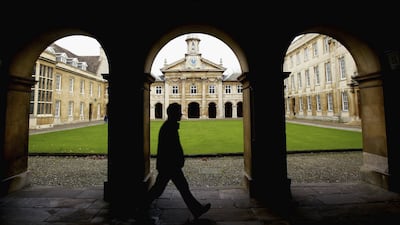British universities are calling for the government to introduce the first fee increase in a generation to help struggling institutions as 40 per cent face making a loss this year.
In a blueprint published on Monday, the Universities UK group said institutions' current "boom and bust" approach to international students is "unsustainable".
Many rely on income from international students to keep them afloat, as they can charge them higher fees compared to those whose permanent home is in the UK. Annual fees for domestic students are capped by the government at £9,250 ($12,380) in England and Wales.
Now, Universities UK is recommending capped tuition fees should be index-linked to inflation, in which the figure would rise to £12,723 for every student.
The report said failing to keep pace with inflation "has led to many institutions actively pursuing the recruitment of international students because they are not subject to similar fee caps".
"However, international education is competitive and demand is volatile, particularly as most recruitment relies on a small number of countries," it said. "A more secure foundation is needed. The boom-and-bust approach to international student recruitment does not work."
It pointed out that funding for those studying to become a teacher has declined almost every year since 2015-2016, and the most recent data shows that per-student funding is at its lowest point since 2004, with the £9,250 fee currently worth £5,924 in 2012-2013 prices.
"Tuition fees should be index-linked to inflation, not to address the funding shortfall, but to allow fee income to maintain its real-terms value over time," it said. "This is an essential step that must be taken as soon as possible."
Earlier this year the Office for Students wrote to more than 20 of the most at-risk universities to warn they are under threat of closure if they continue to rely too heavily on income from foreign students.
In 2022-23, a total of 43 providers (16 per cent of the sector) reported surpluses that exceeded 10 per cent of income, whereas 93 providers (35 per cent of the sector) reported losses.
Providers’ forecasts show this increasing to 108 providers (40 per cent of the sector) in deficit this year.
Universities have been relying on international students for almost a quarter of their income and in 2022/23 they generated £11.8 billion in fee income alone.
But huge drops in international student numbers following recent visa changes, inflation in home countries and competition have led to shrinking numbers, particularly at postgraduate level, leaving almost half of Britain's universities in jeopardy.
"We stand at a fork in the road in the history of the UK’s universities," said Prof Dame Sally Mapstone, president of Universities UK.
"There is now a clear choice. We can allow our distinguished, globally competitive higher education system to slide into decline. Or we can act together, as institutions and with government, to ensure that our universities are able to deliver for the nation into the 2030s."
Universities UK is calling for the government to review its visa policy restricting students bringing dependants and the immigration fees it charges them. "In the short term, it is imperative that the government does not damage universities’ ability to attract international students," it says.
"The removal of visas for dependants should be reviewed for its impact on equity, diversity and diversification and on the UK’s wider strategic objectives, in particular its effect on programmes designed for students with significant professional experience.
"To improve the UK’s attractiveness, the government should look to make the UK a more competitive destination. It should review and benchmark immigration costs for academics, entrepreneurs and technical staff with comparable countries to ensure that the UK attracts talented people."
Prof Shitij Kapur, vice chancellor and president of King’s College London, and John Rushforth, executive secretary of University Chairs, said reliance on international students has run its course.
"Despite a fixed and shrinking domestic resource, they have managed to engage internationally and generate the revenues to support research and domestic education of the highest quality," he said. "However, that innings has run its course. If universities are forced to play the same game for longer, we jeopardise the sector and its international reputation and success.
"It is time for universities and government to sit down together and agree a new financial model for the system that works for students, serves all our regions and ensures the future growth and prosperity of the UK."
Sir Anthony Seldon, former vice chancellor of the University of Buckingham, said the report was an example of "fighting talk".
UK university rankings - in pictures
"The test of this report is whether it will mark the high point of UUK activism, or merely the staging post on an entirely new vision for it and the sector," he said.
"The dream is for government to be following the agenda of UUK, not vice versa. To achieve that, and it's already moving rapidly in the right direction, UUK needs to grow and for existing bodies including the Russell Group to cede more authority to it."












